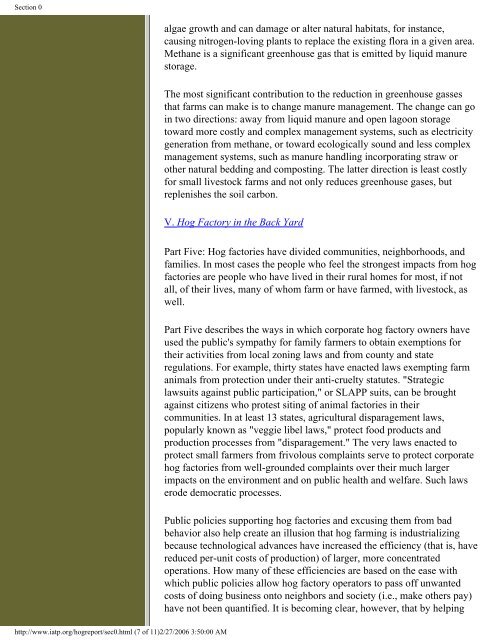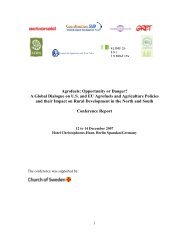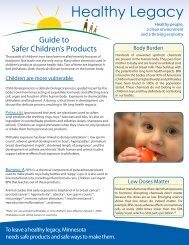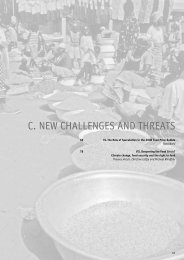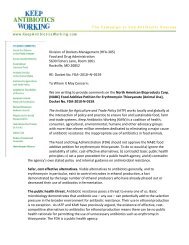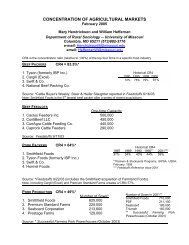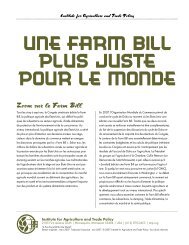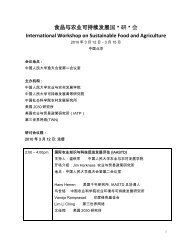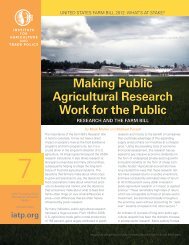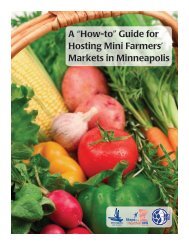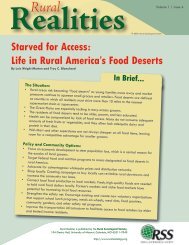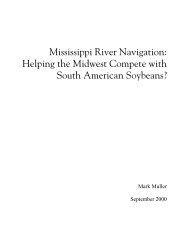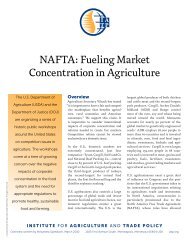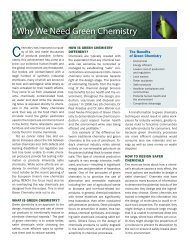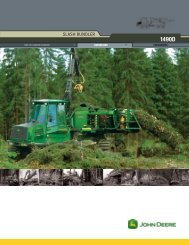IATP Hog Report - Institute for Agriculture and Trade Policy
IATP Hog Report - Institute for Agriculture and Trade Policy
IATP Hog Report - Institute for Agriculture and Trade Policy
You also want an ePaper? Increase the reach of your titles
YUMPU automatically turns print PDFs into web optimized ePapers that Google loves.
Section 0<br />
algae growth <strong>and</strong> can damage or alter natural habitats, <strong>for</strong> instance,<br />
causing nitrogen-loving plants to replace the existing flora in a given area.<br />
Methane is a significant greenhouse gas that is emitted by liquid manure<br />
storage.<br />
The most significant contribution to the reduction in greenhouse gasses<br />
that farms can make is to change manure management. The change can go<br />
in two directions: away from liquid manure <strong>and</strong> open lagoon storage<br />
toward more costly <strong>and</strong> complex management systems, such as electricity<br />
generation from methane, or toward ecologically sound <strong>and</strong> less complex<br />
management systems, such as manure h<strong>and</strong>ling incorporating straw or<br />
other natural bedding <strong>and</strong> composting. The latter direction is least costly<br />
<strong>for</strong> small livestock farms <strong>and</strong> not only reduces greenhouse gases, but<br />
replenishes the soil carbon.<br />
V. <strong>Hog</strong> Factory in the Back Yard<br />
Part Five: <strong>Hog</strong> factories have divided communities, neighborhoods, <strong>and</strong><br />
families. In most cases the people who feel the strongest impacts from hog<br />
factories are people who have lived in their rural homes <strong>for</strong> most, if not<br />
all, of their lives, many of whom farm or have farmed, with livestock, as<br />
well.<br />
Part Five describes the ways in which corporate hog factory owners have<br />
used the public's sympathy <strong>for</strong> family farmers to obtain exemptions <strong>for</strong><br />
their activities from local zoning laws <strong>and</strong> from county <strong>and</strong> state<br />
regulations. For example, thirty states have enacted laws exempting farm<br />
animals from protection under their anti-cruelty statutes. "Strategic<br />
lawsuits against public participation," or SLAPP suits, can be brought<br />
against citizens who protest siting of animal factories in their<br />
communities. In at least 13 states, agricultural disparagement laws,<br />
popularly known as "veggie libel laws," protect food products <strong>and</strong><br />
production processes from "disparagement." The very laws enacted to<br />
protect small farmers from frivolous complaints serve to protect corporate<br />
hog factories from well-grounded complaints over their much larger<br />
impacts on the environment <strong>and</strong> on public health <strong>and</strong> welfare. Such laws<br />
erode democratic processes.<br />
Public policies supporting hog factories <strong>and</strong> excusing them from bad<br />
behavior also help create an illusion that hog farming is industrializing<br />
because technological advances have increased the efficiency (that is, have<br />
reduced per-unit costs of production) of larger, more concentrated<br />
operations. How many of these efficiencies are based on the ease with<br />
which public policies allow hog factory operators to pass off unwanted<br />
costs of doing business onto neighbors <strong>and</strong> society (i.e., make others pay)<br />
have not been quantified. It is becoming clear, however, that by helping<br />
http://www.iatp.org/hogreport/sec0.html (7 of 11)2/27/2006 3:50:00 AM


